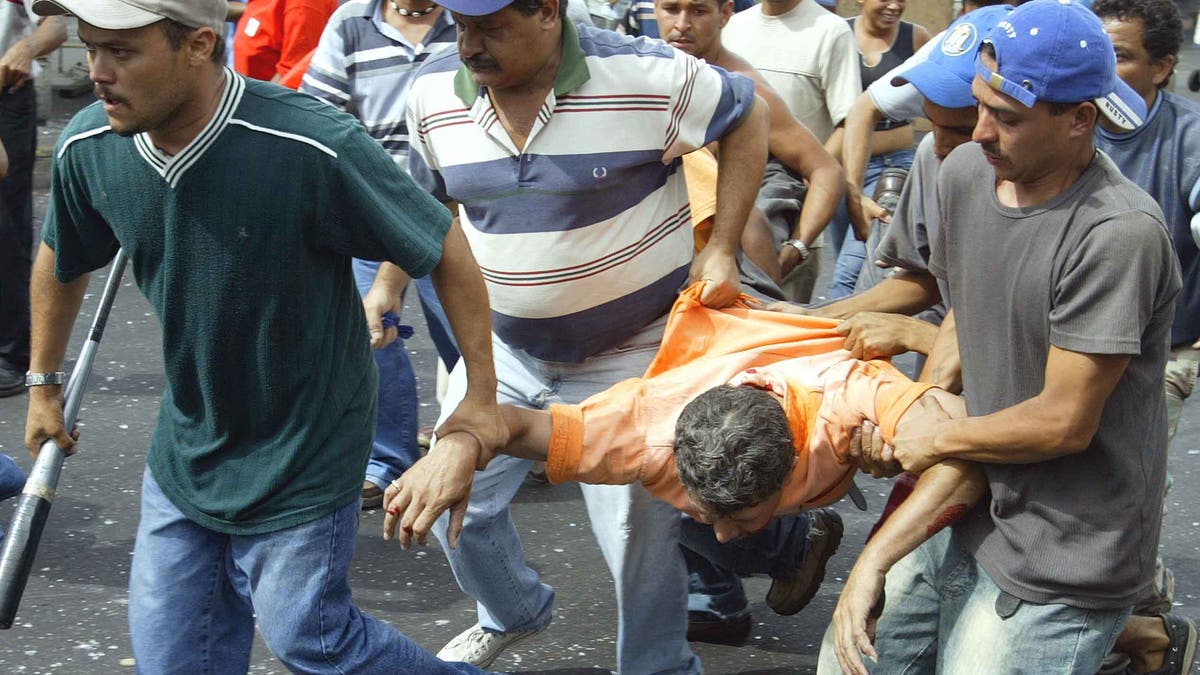
Supporters of Venezuelan President Hugo Chavez carry an injured man June 13, 2003 in Caracas, Venezuela. (2003 Getty Images)
Caracas – A couple of weekends ago, late on a Saturday night, a young criminal was caught stealing in a subway station located in a middle-class Caracas neighborhood. A mob surrounded and attacked him, and when he fell to the floor with blood all over his face and body, they continued to punch him and kick him — one man even took his belt off to whip him.
“Beat him in the nuts!” yelled one man from the crowd. “You are not brave if you don’t have your gun!” added another.
Five minutes of the beating were captured on video and posted online. The attack only ended when a group of policemen finally arrived in the station and took the man out. Even then the mob followed them and continued punching the alleged thief.
Scenes like this are becoming increasingly common in Caracas and across Venezuela. According to a count by Fox News Latino, so far this year at least 35 cases of mob attacks (in Spanish linchamientos, or lynching) have been reported by local newscasters.
While most of the cases were in response to a thief caught in fraganti, more serious crimes like murder and sex-related crimes have also triggered the people’s rage.
The nearly three dozen 2015 cases occurred in various states — and in more than 10 of them, the criminals ended up dead at the hands of the neighbors and passersby. Back in April, an alleged murderer was burned alive by a mob in the western city of Zulia.
Experts say the number of lynching cases is on the rise because the crime rate is also increasing and there is a widespread sense of insecurity.
“The government is failing on its responsibility of taking care of people’s lives, so society tries to replace the government with these actions,” Ramón Piñango, a local sociologist and teacher at the Institute of Superior Administration Studies, told FNL.
In Venezuela and other Latin American countries, having mobs take the law into their own hands is not something unheard of — but unlike the Venezuelan phenomenon, they are far and apart and tend to be confined to the poorest areas. More than 10 of the 35 cases in Caracas this year took place in middle and upper class neighborhoods such as Los Ruices and Los Palos Grandes.
“People are feeling a systematic increase in the probabilities of being murdered by criminals on the streets,” Piñango said, “so everyone is trying to protect themselves.”
This stress tends to accumulate, he added, and explodes when a criminal is caught in a vulnerable position. “Some people end up trying to take revenge for all that they have been suffering,” Piñango explained.
Since the so-called Chavista revolution took power in 1999, crime has increased to unprecedented numbers. To date, 21 different security plans have been implemented by the government — none of them effective.
According to Venezuela's Observatory of Violence, a local NGO, 24,980 murders were committed in 2014, making it the second most violent country in the world behind Honduras.
The NGO reported that 91 percent of crimes went unpunished.
“I don’t support violence, but when police don’t do their job correctly and criminals are not punished, you end up understanding this people who beat thieves and murderers with their own hands,” said a 25-year-old Venezuelan who asked to remain anonymous.
According to a recent poll by local firm Venebarometro, 61.1 percent of Venezuelans disapprove of the National Police’s job and 54.2 percent disapprove of the National Guard’s, the two national institutions in charge of security.
Security expert Fermin Marmol García, professor in a local university, alerts that the country has a deficit of patrol officers and Crime Scene Investigation agents.
“We need around 30,000 troopers and have less than 7,500,” Marmol said.
On top of that, people don’t trust policemen anymore.
“There have been so many news about police officers who are also members of gangs that now people are suspicious of about everyone,” Piñango added.
This has created an atmosphere in which the respect for human life has dropped dramatically.
“We are at risk of losing conscience about what is good and bad. We are losing respect for the life of others and this government is destroying something really deep: our sense of humanity,” said Bishop Alejandro Moreno, who has devoted decades to the research of violence in Venezuela and has several published books on the matter.
